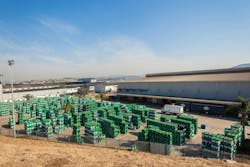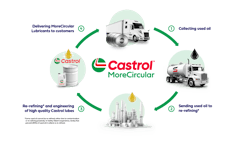An oil and lubricant solution that increases fleet sustainability
When it comes to lowering a fleet’s carbon footprint and contributing to a cleaner environment, electric vehicles and alternatively fueled powertrains receive most of the hype. Yet, there are ways to operate a more sustainable fleet without transitioning to an electrified fleet or interrupting operations. One way is simply by switching to more sustainable vehicle oils.
“Fleet customers are looking for ways to decarbonize their existing operations, and we recognize that the powertrain pathway for commercial vehicles is going to be diverse, and it’s going to be ... a little bit complicated,” Andreas Osbar, president and CEO of Castrol Americas, told FleetOwner. “We believe, though, that a combustion engine—irrespective of what kind of fuel it takes—will have a long pathway still in the U.S. And for these customers, we have now something that helps them to lower their Scope 3 emissions for the foreseeable future.”
Castrol recently debuted a new product line in collaboration with Safety-Kleen. The product line, MoreCircular, uses recycled base oils, then cleans, re-refines, and reformulates the oil to bring it up to the same quality standard as a virgin base oil, Osbar said. In this way, Castrol takes the oil refining process from linear—sending refined virgin oil to customers for them to discard after use—to a circular process. The new lineup debuted in Las Vegas at the Advanced Clean Transportation Expo.
“We believe this is a great way for our customers to combine a low-carbon lubricant solution together with the high-quality lubrication solution that customers associate with Castrol,” Osbar said.
See also: Castrol launches MoreCircular to reduce carbon footprint
High quality, low emissions
One might find it hard to believe that recycled oil can offer the same quality as virgin oil, but Osbar explained that it does because of Castrol’s re-refining process.
How Castrol ensures MoreCircular products are just as good as virgin oil-based products
“We wouldn’t put our brand name to [MoreCircular offerings] if we didn’t believe in the quality ... We feel super confident that this an offer that has no compromise whatsoever on quality.” -Andreas Osbar, Castrol Americas president and CEO
- Quality check: First, Castrol compared a re-refined base oil with a virgin base oil, ensuring that the re-refined oil was comparable to the virgin oil.
- Innovation: Next, Castrol developed the additive technology through testing and trials until Castrol’s formulated, re-refined product met or exceeded industry norms and OEM approvals.
- Field testing: Finally, Castrol sought to prove its MoreCircular products in the field. One test ran re-refined oil in a truck for 1,000 hours. A sample of that oil was then used to compare the quality of re-refined oil to the quality of used virgin-based oil—which showed no difference in oil quality.
It starts with the collection process, where the Safety-Kleen partnership comes in. Safety-Kleen collects used motor oils across the U.S. and Canada and is committed to returning 95% of the collected fluid to its refineries. While Castrol will offer its customers both the collection and the finished lubricants, Safety-Kleen will physically collect their waste oil and take it to one of Safety-Kleen's re-refineries. This re-refined process cleans the recycled oil into a usable base oil.
At this point, the re-refined base oil is sent to Castrol, where it’s blended with Castrol’s additive technology that “we’ve been developing to get the product to a finished lubricant standard,” Osbar said.
“Castrol, as a premium lubricants provider, has an extremely high-quality standard, and we have done quite a bit of technology work to get the finished lubricant to a quality standard that is comparable to a virgin product,” Osbar explained. “That part of it, that's the true innovation that we're bringing in.”
Castrol is the first “major branded player in the U.S. lubricants industry” to offer a complete portfolio of re-refined lubricants on a national scale, according to Osbar, and Castrol believes “the market is ready.”
Castrol's MoreCircular lubricant portfolio offers a reduction of 20 to 40% Scope 3 carbon emissions compared to a virgin oil-based lubricant solution, according to Castrol’s internal and independent studies. Using recycled oil eliminates the need to process crude oil, contributing to these reductions.
Until now, customers have had to choose between a known, high-quality product made from virgin crude oil or choose a product with a lower carbon footprint, Osbar said. “Now, customers don't have to do that,” he explained. “They can have it all out of one hand.”
The Castrol MoreCircular portfolio includes motor oils, hydraulic fluids, and some transmission fluids, with a broader range of transmission fluid offerings to be available in the future.
About the Author
Jade Brasher
Senior Editor Jade Brasher has covered vocational trucking and fleets since 2018. A graduate of The University of Alabama with a degree in journalism, Jade enjoys telling stories about the people behind the wheel and the intricate processes of the ever-evolving trucking industry.


